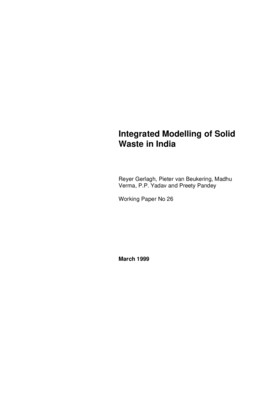Integrated Modelling of Solid Waste in India

Solid waste management (SWM) in developing countries has traditionally focused on organisational and technical concerns. However, this approach neglects the many activities and actors that waste management comprises. We propose a new paradigm of SWM which extends the technical model to tackle a range of problems associated with waste management in order to achieve socially and environmentally responsible waste management. This includes a range of activities, issues and processes such as the types of waste generated, the number of stakeholders and economic activities involved, and the various economic, social and environmental effects of SWM and may include legitimisation of the informal system, public participation and possibly partial privatisation. Such an approach must therefore adopt a more comprehensive and broader perspective, and, because of this complexity, it is necessary to incorporate insights from several disciplines to develop effective management of solid waste. This paper attempts to offer such an approach by incorporating these issues in an economic framework. To evaluate the effectiveness of different SWM alternatives, a linear programming model has been developed. The main objective of the model is to minimise overall system costs and to identify low cost alternatives to manage household, institutional and industrial waste. Although it has been developed as a classic single objective model, ie to minimise costs, it does incorporate social and environmental objectives associated with SWM; thus, it may be regarded as one which aims to find sustainable solutions. The set up of the model is comparable with input-output modelling with additional objectives embedded as side constraints. To demonstrate its relevance, the model is applied to the Indian city Bangalore. Various scenario runs are presented. This empirical exercise does not only reveal the model’s strengths such as revealing important interdependencies in the waste management sector, but also highlights its weaknesses such as the demand for high quality data. Nevertheless, this model may be considered a valuable first step in evaluating integrated SWM in developing countries.
Cite this publication
Available at https://www.iied.org/8114iied